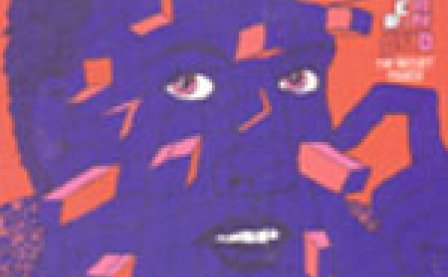Truisms on the nature and novelty of two-piece troupes fall quite flat in apprehending the work of Mick Flower and Chris Corsano, virtuoso madmen whose contributions to American experimental music are by now legion. Flower, the electro-acoustic sage on “Japan banjo”; Corsano, the shape-shifting genius drummer boy of aggro-jazz, noise rock, and, well, cricketing: to perceive The Four Aims as the work of just a duo is to gloss over the immense complexity within each pole, the subdivisions and layers of sonic sedition that weave through each man’s playing. It’s a profoundly collaborative product, but even to voice that cripplingly broad claim is to evade the dynamics of contention that enliven and, indeed, define the record. The five pieces and 51 minutes evince a mounting tension whose internal logic begs inspection only after having run its course, interpellating and pummeling the curious into bewildered submission.
The record’s master narrative isn’t, as some will intuit, a confrontation of the tonal with the atonal. Rather, it pits stasis against intervention — the former emanating from the banjo’s droning lower register and from Corsano’s cello and bowed percussion; the latter most obviously from Corsano’s perfect storm of cymbalism and skin trade. The production, confusingly, muddles some of Corsano’s heroics, drowning his murderous snare shots beneath the set’s more resonant elements, and it’s a crying shame. Vampire Belt, for instance, by certain rubrics his most destructive project, sustained the pain on the strength of Corsano’s left hand. Here, its labors are obscured, occluded by mic placement. Still, a certain determination radiates from his slice-and-dice routine, and in tandem with Flower’s multivocal orrery of plucking and wailing, melody and drone, the product — well beyond an on-the-other-hand mentality descended from the spirit of the duel — is dense indeed, a total synthesis.
EQ notwithstanding, Corsano is a reliable foil, his rhythm collision pushing Flower’s improvisations to new levels of neurosis. The middle three tracks pursue broadly conceived, atmospheric effects, Corsano supplying circular breathing to the melodica while Flower, especially on “The Drifter’s Miracles,” protracts the sort of nagging expectancy that mounts as a symphony slouches into tune. “I, Brute Force?,” the opener, models the sadistic onslaught possible at the duo’s outer limits but unrevived until some seven minutes into closer “The Main Ingredient.” There’s a method, that is to say, but not one whose formal conceit ultimately suppresses the dialectic of nuance and anxiety that animates each player’s craft.
The Four Aims contains grooves; melodic patterns lurk. But the record is so dense, so slyly epic, that these traces reveal themselves only in retrospect. Flower and Corsano don’t practice show and tell, and their wildly responsive interplay speaks to a certain tacit accord on the acceptable limits of disclosure. Secrets remain untold: if the noisy, squalling sections of The Four Aims could be taken up a notch — as it seems to me they could — only their practitioners know quite how. In compositional breadth, in technical twinkle, in (a)tonal assault, this is a deeply humbling record, the inscrutable blueprint for progress.
1. I, Brute Force?
2. The Three Degrees of Temptation
3. The Drifter’s Miracles
4. The Beginning of the End
5. The Main Ingredient
More about: Flower-Corsano Duo


